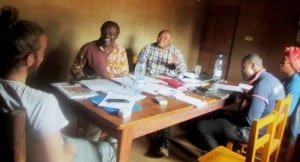
Some three non-profit organizations including the Environment and Rural Development Foundation (ERuDeF), African Center for Renewable Energy and Sustainable Technology (ACREST), and GADD have begun working with the International Union for the Conservation of Nature (IUCN) to develop a pilot project for the conservation and restoration of the degraded Mount Bambutous Landscape.
Coming within the framework of the IUCN PPI-5 program, these non-profit orgnisations, during a two day working session, January 14-15, 2017, at ACREST Head Office in Bangang, were each given a project component within their area of competence and intervention to develop. The organizations each came out with specific objectives and activities based on the project components they are to lead.
ERuDeF for instance will lead the Agro-forestry and Biodiversity Conservation, and governance components of this pilot project. Within this component, the organization will ensure the enhancement of agro-forestry practices in farmers plots within the project site through capacity development of farmers, nursery development and transplanting, and the establishment of the farm optimization model in communities within the site.
It will also ensure that the degraded landscape of Mt. Bamboutos is restored and the biodiversity of the area conserved. This will be achieved through the out planting of seedlings within the degraded landscape, biodiversity inventory, sensitization and environmental education, monitoring of illegal activities, payment for ecosystem service schemes (PES), and alternative livelihood supports (beekeeping, NTFP value chain development, livestock breeding etc)
As far as governance is concerned, ERuDeF will be promoting sustainable land use governance and management through the production of past and actual land use of the project site, identification of stakeholders, participative mapping, workshops, defining suitable areas for protection and conservation, strengthening of communication systems and the propagation and enforcement of existing laws amongst others.
GADD on her part, will head the Sustainable agriculture and value chain development component of the project. In this light, the organization will work towards promoting the practice of sustainable agriculture and value chain development. This will be achieved through sensitization and capacity building of stakeholders, establishment of demonstration plots, documentation of good practices, identification of value chain to be supported, and others.
Meanwhile ACREST will be the lead NGO in the area of Technology and Renewable Energy. Here, the organization will be ensuring the promotion of appropriate technology and renewable energy within the Mt Bamboutus area with focus on the development of water supply systems, installations of solar systems, biogas systems and improved cooking stoves
for homes, provision of solar drier, solar fridge and chip producer for food transformation, and the ensuring the practice of drip irrigation, grafting techniques and the construction of transport equipment and tools with the project area.
At the end of the workshop, PPI-PACO Programme Coordinator, Thomas BACHA, congratulated these organizations on their efforts in developing key activities and objects of the components allocated to them. He urged each of the organizations to develop a logical framework based on the specific objectives and activities under their respective project component.
The organizations were also implored to seek co-funding and the submit project proposal within their respective project component by April 2017. The project is expected to begin in August 2017.
By Deh Nji & Tengem Adeline



